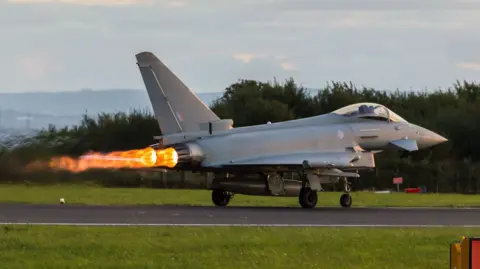In the midst of escalating tensions in the Middle East, the United Kingdom is responding by deploying additional RAF jets to the region. Prime Minister Sir Keir Starmer made this announcement amidst ongoing conflicts between Israel and Iran, emphasizing the need for contingency support in the area. The situation is described as rapidly evolving, prompting consistent dialogue with international allies. Starmer stressed the importance of de-escalation in his remarks, underlining that all military and diplomatic actions are aligned with that goal.
This deployment follows a previous announcement from the UK government regarding the role of British aircraft in mitigating potential escalations. The prime minister’s statements reflect a proactive stance as he emphasized that discussions regarding military assets were underway. Sir Keir remarked that the country’s focus remains on de-escalating the situation, which he reiterated as a consistent objective in all communications related to regional stability.
As the prime minister made his remarks, he was en route to Canada for the G7 summit, indicating discussions with world leaders regarding the “intense” developments over the weekend. He highlighted that assets, specifically RAF jets, are currently being relocated to the Middle East to provide necessary support. While Sir Keir recognized the need for a defensive posture, he refrained from disclosing specifics about the UK’s potential role in defending Israel, maintaining a diplomatic tone throughout his comments. His conversation with Israeli Prime Minister Benjamin Netanyahu, from the previous day, revolved around the safety and security of Israel but did not delve into specifics about military alliances or actions.
Sir Keir also pointed out the UK’s longstanding apprehensions regarding Iran’s nuclear program, reiterating the country’s recognition of Israel’s right to defend itself. The tensions are further complicated by Iran’s threats to target military sites of the UK, France, and the United States should they proceed to aid Israel in its operations against Iranian entities. This geopolitical context has necessitated a delicate balance in the UK’s diplomatic approach, as Prime Minister Starmer navigates the intricate web of alliances and animosities in the region.
Furthermore, Sir Keir engaged in discussions with Saudi Arabia’s Crown Prince Mohammed bin Salman, where they both expressed grave concern about the unsettling situation in the Middle East. They agreed on the urgent need for de-escalation, reflecting a unified stance among certain Middle Eastern allies regarding the ongoing conflict. The backdrop of recent military activities complicates the peace landscape, especially following missile and drone assaults initiated by Iran against Israel after Israeli airstrikes on Iranian sites.
Reports indicate casualties from both sides, with tragic losses reported in Tehran and Israel alike. Amidst humanitarian concerns, diplomatic avenues between Washington D.C. and Tehran regarding Iran’s nuclear ambitions have seemingly faltered, as scheduled talks were abruptly canceled. The complexities of military engagement, regional alliances, and nuclear negotiations underscore a highly volatile environment.
In summary, the UK’s strategic deployment of RAF jets serves to reinforce its commitment to maintaining stability in a region fraught with hostility. As the G7 summit approaches, Sir Keir Starmer’s plans to discuss these developments with global leaders will be crucial in framing a collective response to the ongoing crisis and in determining how best to support de-escalation efforts in the Middle East. The dimensions of this conflict highlight not only military responses but also the intricate dance of diplomacy required to navigate such a challenging geopolitical landscape.



